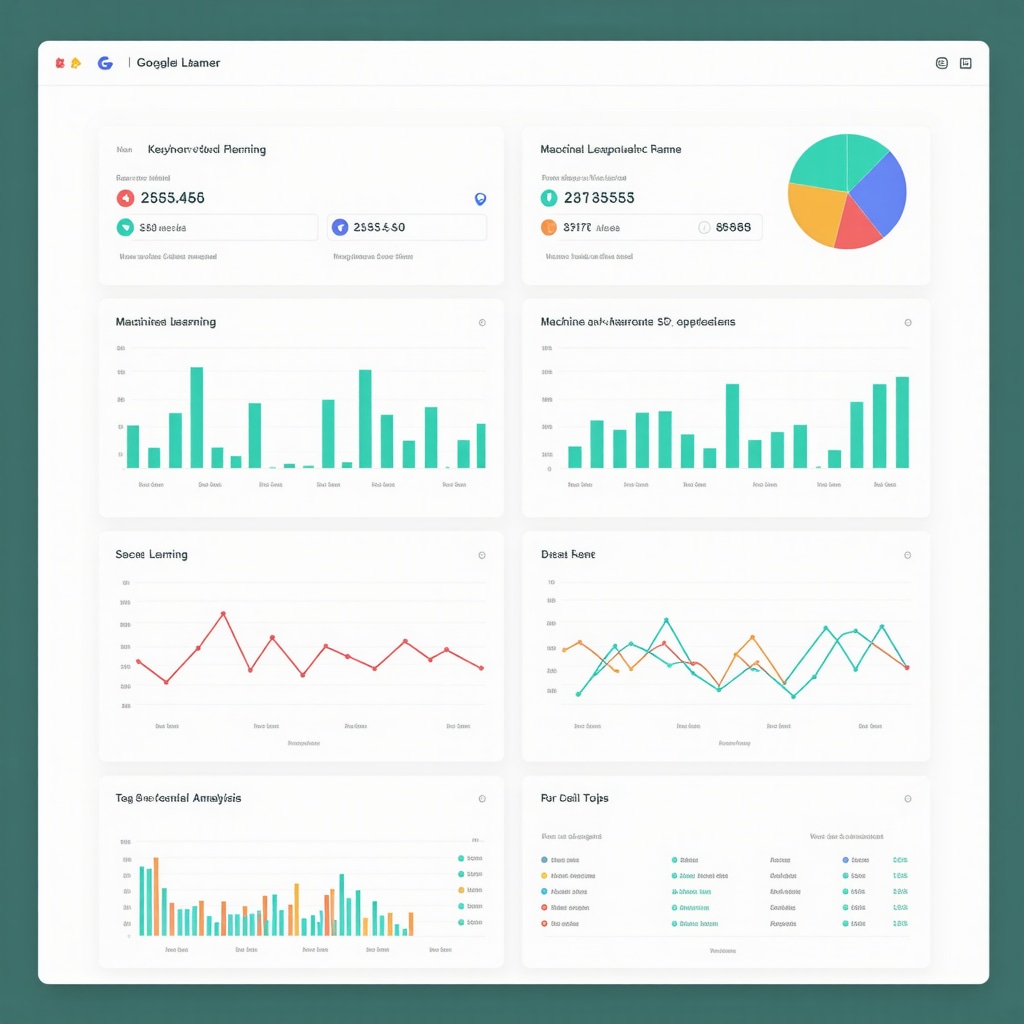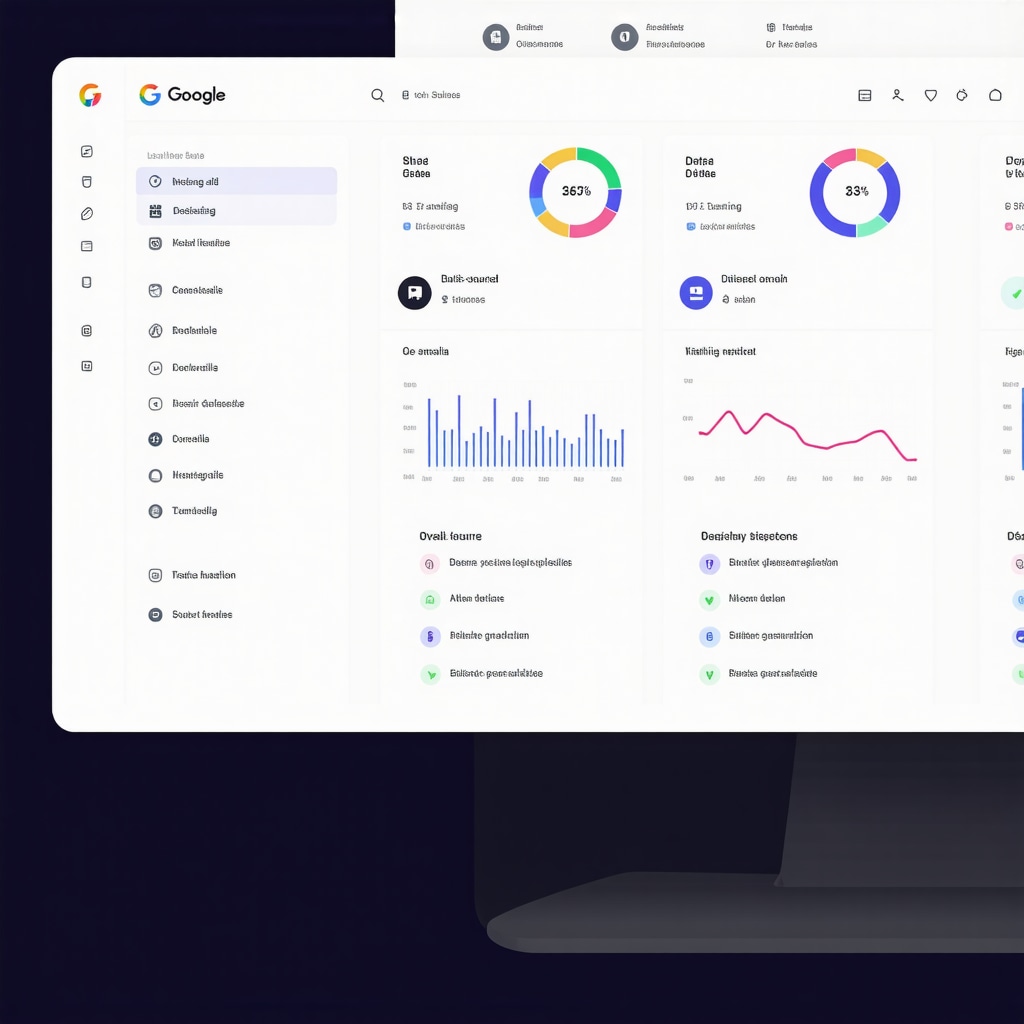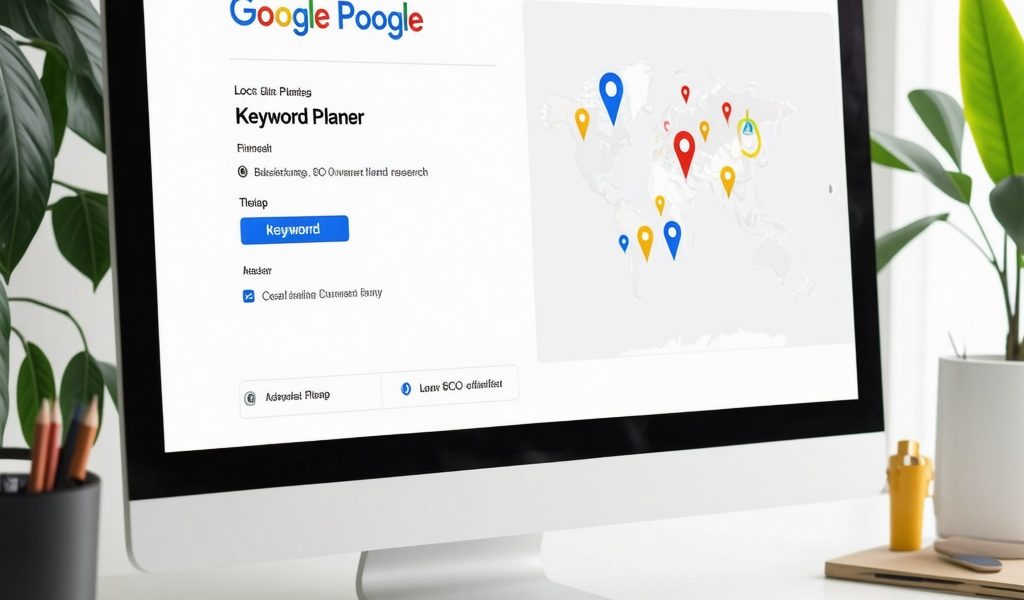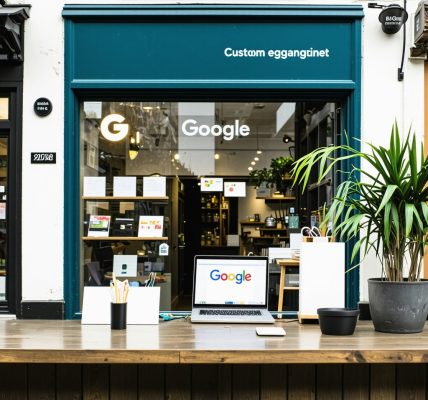Mastering Local Keyword Discovery with Google Keyword Planner for GMB
In the competitive world of local SEO, harnessing the power of Google Keyword Planner to find winning keywords for your Google My Business (GMB) profile is a game-changer. Rather than relying on guesswork or generic terms, leveraging this tool strategically uncovers precise, high-impact local search terms that can elevate your business’s visibility in Google Maps and local search results.
Local businesses often struggle to identify keywords that truly resonate with their target audience. Google Keyword Planner, primarily known for paid search campaigns, offers untapped potential for organic local SEO when used with an expert approach. By aligning keyword data with your GMB listing’s unique attributes, you can attract more qualified traffic and convert local searches into real customers.
Decoding Local Intent: How to Pinpoint High-Value Keywords for GMB
Understanding user intent behind local searches is paramount. Keywords with “near me,” city names, or neighborhood identifiers reveal immediate intent to engage locally. Google Keyword Planner can identify these modifiers and suggest related queries with substantial search volume yet moderate competition—ideal for local businesses aiming to rank quickly.
For example, a boutique bakery in Austin might discover phrases like “gluten-free bakery near me” or “Austin custom cakes” as potent keywords. Incorporating these strategically into your GMB business description, services, and posts not only improves relevance but signals to Google that your business matches specific local demand.
Leveraging Semantic Keyword Variations to Dominate Local Search
Latent Semantic Indexing (LSI) keywords broaden your relevance scope, helping your GMB to appear for diverse but contextually connected local queries. Google Keyword Planner reveals synonyms, related terms, and long-tail variations that help craft a comprehensive keyword strategy.
Instead of just targeting “plumber,” integrating terms like “emergency plumbing services,” “licensed plumber in [city],” or “24/7 drain cleaning” captures varied searcher intent. This layered approach boosts your GMB’s authority and local prominence, especially when combined with other optimization tactics like citation management and review generation.
How can Google Keyword Planner insights be integrated practically into a GMB SEO strategy?
Integrating Google Keyword Planner insights into your GMB SEO involves a multi-step process: first, conduct thorough keyword research focusing on local modifiers and semantic variations. Next, optimize your GMB business description and category selections with these keywords, ensuring natural flow and user-centric language. Regularly update GMB posts to target trending local queries uncovered by ongoing Keyword Planner analysis. Additionally, align website content and local citations with these keywords for a cohesive local SEO ecosystem.
For instance, a local landscaping service might use Keyword Planner to identify seasonal terms such as “spring garden cleanup” or “fall leaf removal near me,” incorporating these into GMB updates and service descriptions for timely relevance.
This approach is supported by Moz’s expert insights on local keyword research, which emphasize the importance of context and intent in driving local SEO success (Moz Local SEO Guide).
Practical Tips to Boost Your GMB Visibility Using Google Keyword Planner
- Target Long-Tail Local Keywords: Focus on specific, less competitive phrases that match buyer intent.
- Incorporate Keywords in GMB Attributes: Use them in business descriptions, services, and posts for maximum impact.
- Monitor Keyword Trends: Regularly revisit Keyword Planner for emerging local search patterns.
- Align Website and GMB SEO: Ensure your website content complements your GMB keywords for better authority.
For expanded tactics on optimizing your Google Business profile with keyword strategies, explore our detailed guide on using Google Keyword Planner to boost your GMB listing.
Are you ready to unlock the full potential of your Google My Business profile by discovering the best local keywords? Contact us to get expert support tailored to your business goals.
Advanced Strategies for Keyword Refinement and Expansion
Once you have identified a core set of local keywords using Google Keyword Planner, the next step is refining and expanding this list to capture even more nuanced search intent. An expert approach involves analyzing keyword performance metrics such as competition levels, average monthly searches, and suggested bid values to prioritize terms that offer the best balance of traffic potential and ranking feasibility.
Additionally, consider using Google’s “Searches related to” feature in conjunction with Keyword Planner insights to uncover hidden keyword gems. Combining these techniques helps in constructing a layered keyword architecture that supports multiple local search queries, increasing the likelihood of your GMB profile appearing in diverse local searches.
Integrating Keyword Data with GMB Content Updates and Customer Interaction
Beyond static optimization of your business description and categories, dynamically updating your GMB posts with keyword-focused content is a powerful tactic. For example, promoting special offers or seasonal services using trending local keywords identified via Keyword Planner can amplify engagement and signal to Google that your profile is active and relevant.
Encourage customer reviews that naturally incorporate your target keywords and related phrases. This not only enhances local relevance but also builds trust and authenticity. Responding promptly to reviews and questions with keyword-rich, personalized replies further strengthens your GMB profile’s authority.
What role does competitor keyword analysis play in refining your GMB keyword strategy?
Competitor keyword analysis is critical for understanding the local SEO landscape and identifying gaps or opportunities. Tools like Google Keyword Planner allow you to explore keywords your competitors rank for, their estimated search volumes, and competition levels. This intelligence enables you to tailor your keyword strategy to focus on underserved niches or capitalize on high-value terms that competitors may overlook.
By benchmarking against local competitors, you can fine-tune your keyword targeting to better match customer intent and increase your chances of securing top spots in the Google 3-pack and Maps results. Combining competitor insights with your ongoing keyword research creates a dynamic, data-driven approach that adapts as market conditions evolve.
For a comprehensive overview of competitor research techniques tailored for GMB SEO, refer to our guide on understanding local SEO for small businesses.
Maintaining Keyword Relevance Amid Evolving Local Search Trends
Local search patterns are continuously evolving due to changes in consumer behavior, seasonal shifts, and emerging local events. Regularly revisiting Google Keyword Planner data allows you to stay ahead by identifying new keyword opportunities and phasing out terms that lose traction.
Implementing a schedule for quarterly keyword audits ensures your GMB listing remains optimized for the most relevant and profitable search queries. Moreover, integrating insights from Google Trends alongside Keyword Planner can provide additional context on rising local interests and seasonal fluctuations.
This proactive maintenance is essential for sustaining high local rankings and maximizing your Google Business profile’s ROI. For practical tactics on maintaining consistent local SEO performance, explore our article on effective GMB content updates to improve local search rankings.
According to a recent study by BrightLocal, 76% of consumers who conduct local searches visit a business within 24 hours, highlighting the critical need for timely and targeted keyword optimization in your GMB strategy (BrightLocal Local Consumer Review Survey).
Have you experimented with integrating seasonal and event-based keywords into your Google Business profile? Share your experiences or questions in the comments below to help foster a community of local SEO experts and enthusiasts.
Leveraging Machine Learning and Predictive Analytics for Next-Level Keyword Strategy
In the evolving landscape of local SEO, integrating machine learning (ML) and predictive analytics with Google Keyword Planner data can revolutionize your GMB keyword strategy. These advanced technologies analyze vast datasets — including historical search volumes, click-through rates, and conversion metrics — to forecast emerging local keyword trends with remarkable precision. By incorporating predictive insights, businesses can proactively optimize their GMB profiles to capture future search demand before competitors do.
For instance, ML models can identify subtle shifts in local consumer behavior, such as rising interest in eco-friendly services or new neighborhood developments, enabling timely content updates and keyword targeting. This data-driven foresight ensures your Google My Business listing remains at the forefront of relevant local queries, driving sustained traffic and engagement.
Semantic Search Evolution: Employing NLP to Refine Keyword Context and User Intent
Natural Language Processing (NLP) has transformed how search engines interpret queries, moving beyond mere keyword matching toward understanding semantic context and user intent. Applying NLP techniques to your keyword research allows for the identification of nuanced phrase variations and conversational queries prevalent in voice and mobile search.
For example, instead of solely focusing on “plumber in Brooklyn,” NLP reveals queries like “who is the best emergency plumber near Brooklyn?” or “licensed drain cleaning experts open now.” Targeting such intent-rich, conversational keywords within your GMB posts and Q&A sections can dramatically improve local search relevance and user engagement.
How can integrating user-generated content enhance semantic keyword optimization in GMB?
User-generated content (UGC), including reviews, questions, and customer photos, offers a rich source of naturally occurring local keywords and phrases that reflect authentic user language and intent. Encouraging and curating UGC with strategically guided prompts can surface latent semantic keywords that might otherwise be overlooked by traditional keyword research tools.
For example, prompting customers to mention specific services, locations, or experiences in their reviews can organically embed high-value keywords into your GMB profile. This authentic content not only boosts local relevance but also improves trust signals and click-through rates. As highlighted in the Search Engine Land article on NLP and SEO innovations, leveraging UGC is a potent strategy for semantic optimization in local search.
Combining Multi-Channel Data for Holistic Local Keyword Strategy
While Google Keyword Planner provides invaluable insights into search volumes and competition, integrating data from other channels like Google Analytics, Google Search Console, and social listening tools enriches your local keyword strategy. This multi-source approach uncovers how users interact with your website and local content beyond search queries, revealing latent demand and content gaps.
Analyzing landing page performance and user behavior metrics helps identify which locally targeted keywords drive engagement and conversions, enabling precise refinement of GMB content and website SEO. Social listening can detect emerging local trends or community interests that inform timely keyword insertion and promotional campaigns.
This holistic data fusion empowers businesses to create a dynamic, responsive local SEO strategy that adapts to real-world user behavior and market shifts.
Are you ready to elevate your Google My Business keyword strategy with cutting-edge data integration and semantic optimization? Reach out to our local SEO experts for a customized consultation that transforms your GMB presence into a dominant local search force.

Unlocking the Power of AI-Driven Keyword Forecasting for Local SEO
Modern local SEO transcends traditional keyword research by integrating Artificial Intelligence (AI) to predict and capitalize on emerging local search trends. By leveraging machine learning algorithms alongside Google Keyword Planner data, businesses can anticipate shifts in consumer search behavior and adapt their Google My Business (GMB) keyword strategies proactively. This predictive capability transforms keyword planning from reactive to strategic foresight, enabling local businesses to secure competitive advantages in rapidly evolving markets.
What advanced tools complement Google Keyword Planner to refine local keyword prediction?
Beyond Google Keyword Planner, sophisticated tools like SEMrush’s Keyword Magic Tool and Ahrefs Keywords Explorer incorporate AI-driven analytics to provide deeper insights into keyword difficulty, search intent, and emerging queries. These platforms utilize vast databases and machine learning models to analyze patterns in search volume fluctuations, competitor performance, and user engagement metrics. Integrating these insights with Keyword Planner enables a multidimensional approach that enhances precision in targeting long-tail, intent-rich local keywords.
For example, Ahrefs allows granular filtering for local search volume trends and keyword variations, while SEMrush offers predictive keyword difficulty scores and seasonal trend analysis. Combining these tools empowers digital marketers to craft highly targeted and adaptive GMB optimization strategies that align with nuanced local search dynamics.
Maximizing Keyword Impact Through Behavioral Analytics and Customer Journey Mapping
Incorporating behavioral analytics into your keyword strategy unveils how users interact with your GMB listing and website, revealing critical touchpoints that influence conversion. Mapping the customer journey from initial query to final action enables identification of keyword opportunities at each phase—from awareness to decision-making.
By analyzing metrics such as click-through rates, bounce rates, and conversion funnels via Google Analytics and Search Console, businesses can tailor their GMB content and keywords to better align with user intent and optimize for engagement. This granularity in keyword application ensures that local SEO efforts resonate with real-world user behavior, driving meaningful traffic and higher conversion rates.
Semantic Enrichment of GMB Content Through Natural Language Generation (NLG)
Natural Language Generation (NLG) technology enhances GMB content by automatically creating contextually rich, keyword-optimized descriptions, posts, and responses that maintain a natural, engaging tone. This technique leverages semantic analysis to incorporate latent keywords and related phrases, improving the listing’s relevance to diverse local queries.
Utilizing NLG tools allows for scalable content updates that reflect evolving search trends while preserving authenticity and user engagement. This approach is particularly effective in generating personalized responses to customer reviews and Q&A interactions that embed targeted keywords seamlessly, boosting semantic relevance and trustworthiness.
Leveraging Cross-Platform Data Synergy for Holistic Local Keyword Insights
Beyond search engine data, synthesizing insights from social media analytics, customer feedback platforms, and local community forums enriches your keyword database with real-time, user-centric language and emerging local topics. Social listening tools like Brandwatch or Mention capture colloquial expressions and trending local issues that traditional keyword tools might miss.
Integrating these diverse data streams with Google Keyword Planner facilitates a comprehensive understanding of local search intent and vernacular, enabling GMB profiles to target highly specific and timely keywords that resonate authentically with local audiences.
According to the Search Engine Journal’s analysis of local SEO data integration, leveraging multi-platform insights significantly improves keyword relevance and local ranking potential.
Are you prepared to elevate your Google My Business keyword strategy using AI, behavioral analytics, and cross-channel data integration? Contact our local SEO specialists today to develop a bespoke, future-proof keyword optimization plan tailored to your business’s unique market dynamics.

Frequently Asked Questions (FAQ)
What makes Google Keyword Planner especially valuable for local SEO and GMB optimization?
Google Keyword Planner provides precise data on search volumes, competition, and keyword variations specifically tied to geographical locations. This enables businesses to discover local intent keywords and long-tail phrases that resonate with nearby customers, improving Google My Business (GMB) visibility in local search and Maps results.
How can I identify the best local keywords using Google Keyword Planner?
Start by incorporating geographic modifiers such as city names, neighborhoods, or “near me” phrases into your seed keywords. Analyze metrics like average monthly searches and competition level to select terms with meaningful traffic but manageable competition. Use related queries and semantic variations to expand your list and capture diverse user intents.
Why is semantic keyword variation important for local GMB listings?
Semantic variations enable your GMB profile to rank for a broader range of related search queries, enhancing local relevance. By including synonyms, service descriptors, and conversational phrases, you signal to Google that your business comprehensively addresses local searcher needs, increasing authority and ranking potential.
How often should I update my GMB keywords and content based on Keyword Planner data?
Regular audits every quarter are recommended to adapt to evolving local search trends, seasonal changes, and emerging events. Continuous monitoring ensures your GMB listing targets timely, high-value keywords and maintains strong local SEO performance.
What role does competitor keyword analysis play in refining my local SEO strategy?
Analyzing competitors’ keywords reveals opportunities to target underserved niches or high-value terms they may neglect. This insight helps you differentiate your GMB profile, optimize keyword selection, and improve your chances of appearing prominently in local pack results.
Can machine learning and AI tools improve my keyword strategy beyond Google Keyword Planner?
Yes. AI-driven platforms analyze complex patterns in search behavior, forecast emerging trends, and provide predictive keyword insights. Integrating these with Keyword Planner data allows for proactive, future-proof optimization that keeps your GMB listing ahead of competitors.
How does user-generated content (UGC) enhance semantic keyword optimization on GMB?
UGC, such as customer reviews and Q&A, naturally includes authentic local language and keyword-rich phrases reflecting real user intent. Encouraging customers to mention specific services, locations, or experiences embeds valuable semantic keywords, boosting local relevance and trustworthiness.
What advanced tools complement Google Keyword Planner for local keyword research?
Tools like SEMrush Keyword Magic Tool, Ahrefs Keywords Explorer, and Google Trends offer enhanced analytics on keyword difficulty, seasonality, and emerging queries. They integrate AI and behavioral data to refine keyword targeting and uncover hidden local search opportunities.
How can behavioral analytics influence my GMB keyword optimization?
By analyzing user interactions, click-through rates, and conversion paths through platforms like Google Analytics and Search Console, you can tailor keyword usage to match actual user intent and engagement patterns, ensuring your GMB content drives meaningful customer actions.
What is the impact of semantic search evolution on local keyword strategies?
Semantic search and natural language processing (NLP) enable search engines to understand context and conversational queries better. Optimizing for intent-rich, natural language keywords enhances your GMB profile’s relevance to voice and mobile searches, which are increasingly prevalent in local discovery.
Trusted External Sources
- Moz Local SEO Guide – Offers authoritative insights into local keyword research, user intent, and practical optimization tactics specific to Google My Business and local search strategies.
- BrightLocal Local Consumer Review Survey – Provides statistically robust data on consumer behavior related to local search and review impact, informing keyword relevance and timing strategies.
- Search Engine Land: NLP and SEO Innovations – Explores how natural language processing transforms SEO approaches, highlighting the role of semantic keywords and user-generated content in local search optimization.
- Search Engine Journal: Local SEO Data Integration – Delivers expert analysis on integrating multi-platform data sources for comprehensive local keyword insights and strategy refinement.
- Google Keyword Planner Documentation and Best Practices – The official resource detailing features, metrics, and advanced uses of Keyword Planner for both paid and organic keyword research.
Conclusion
Mastering local keyword discovery with Google Keyword Planner is essential for maximizing your Google My Business profile’s visibility and engagement in competitive local markets. By combining precise local intent keywords, semantic variations, competitor analysis, and dynamic content updates, businesses can build a robust, adaptive local SEO presence. Leveraging advanced technologies such as machine learning, natural language processing, and multi-channel data integration further sharpens this strategy, enabling proactive adaptation to evolving search trends and user behaviors.
Ultimately, a well-crafted keyword strategy grounded in expert analysis and continuous refinement empowers your GMB listing to capture qualified local traffic, convert searches into customers, and sustain long-term growth. Embrace these insights to elevate your local SEO efforts and establish your business as a dominant force in your community.
Ready to transform your Google Business profile with cutting-edge keyword strategies? Share your thoughts, ask questions, or explore our related expert content to deepen your local SEO mastery and drive real results.


